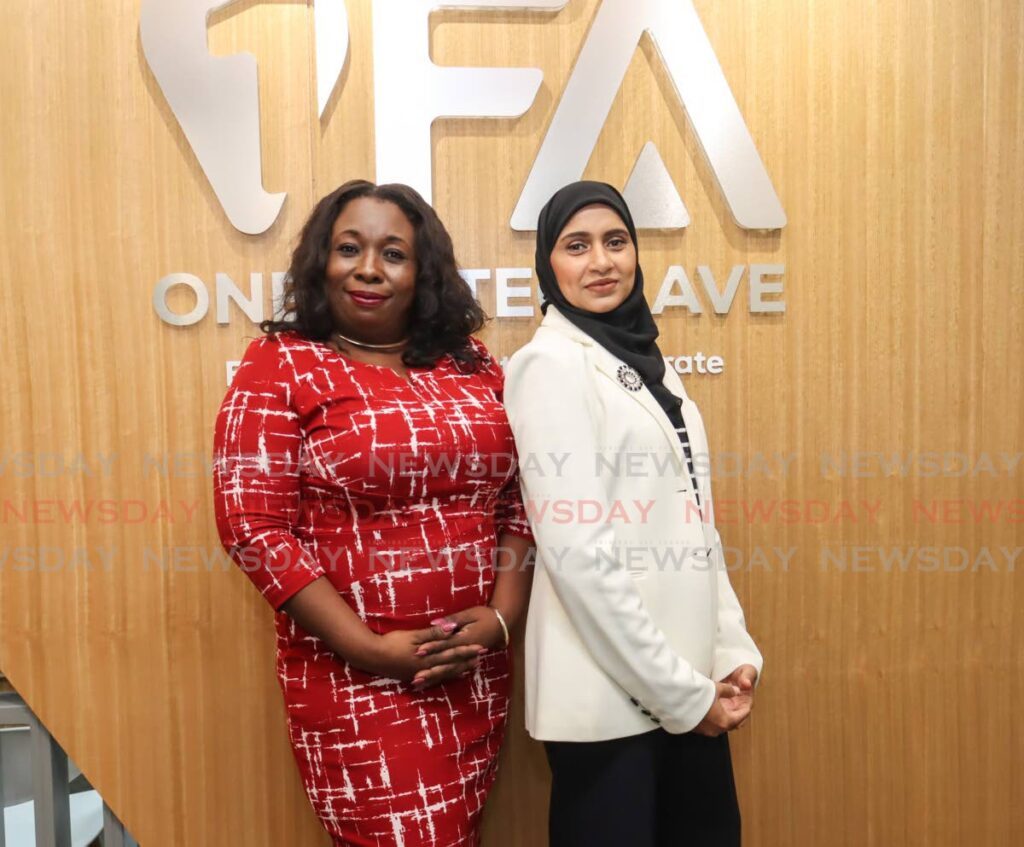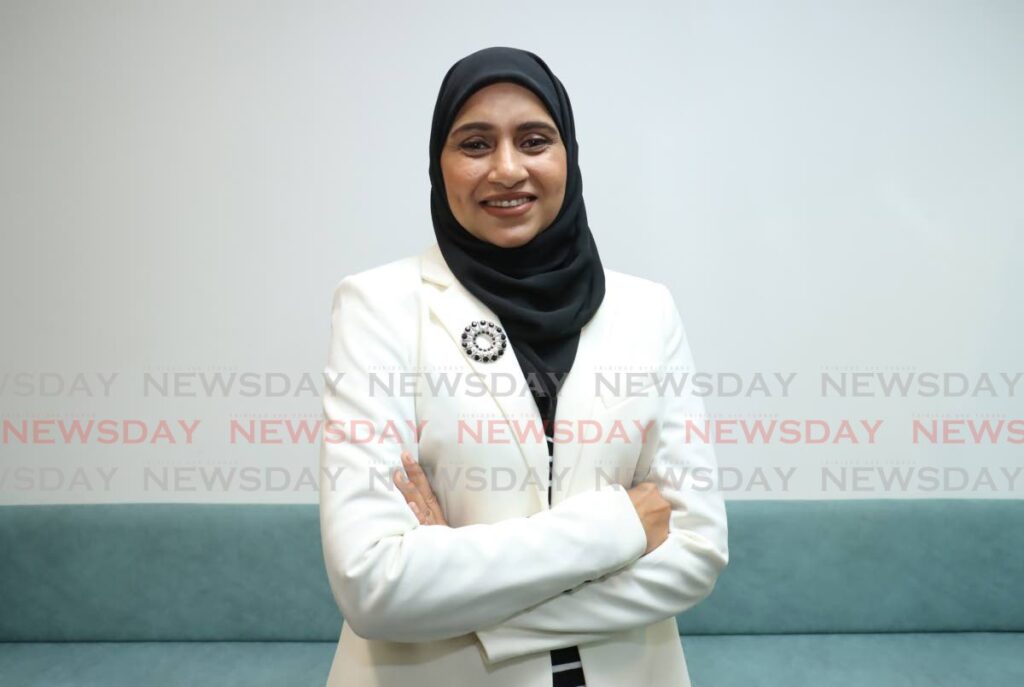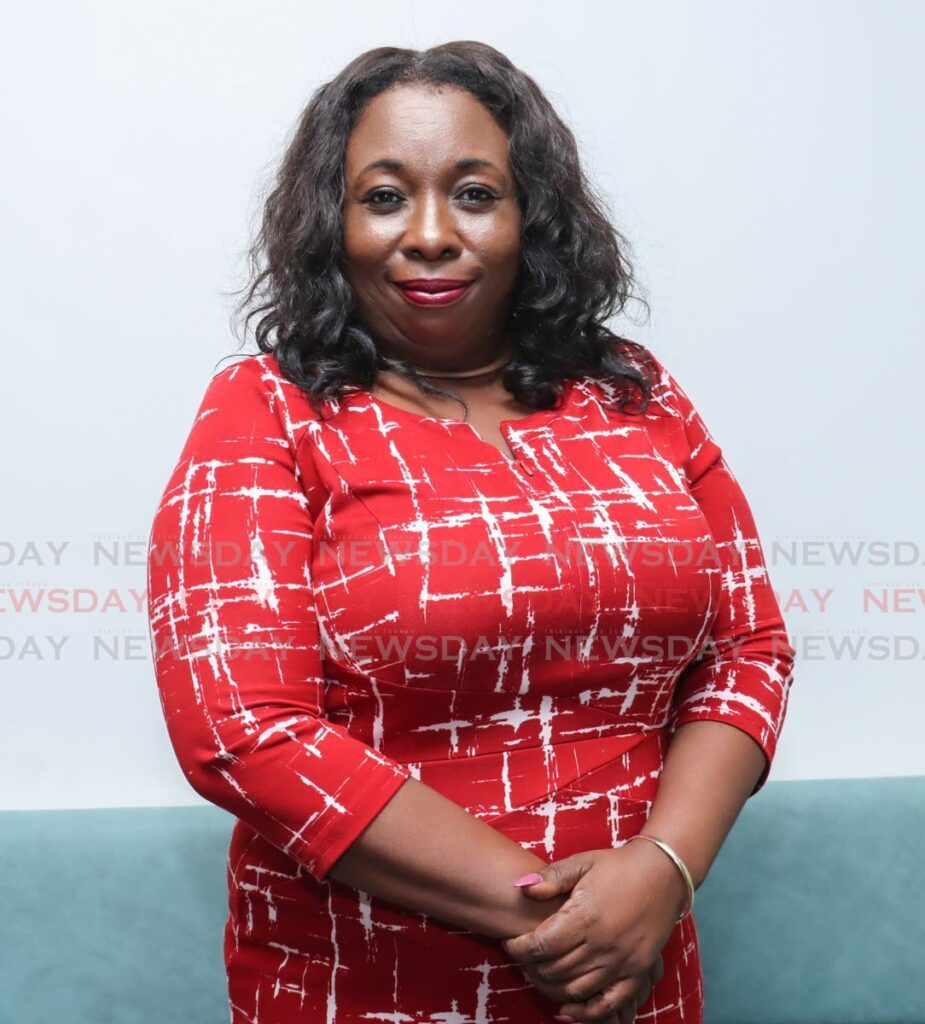TTIFC: 25% of citizens have no access to bank accounts

IN 2024, roughly a quarter of Trinidad and Tobago’s adult population lacks access to a basic transaction account, according to a recent survey by the TT International Financial Centre and the United Nations Capital Development Fund (UNCDF).
The survey found that TT's underserved, particularly women, continue to face unique challenges that Dawn Nelson and Shanaz Mohammed, two women leading the government’s “cashless agenda” at TTIFC have vowed to tackle head-on.
Nelson is TTIFC’s vice-president (financial sector transformation) and Mohammed serves as manager (cashless economy and financial inclusion).
Nelson and Mohammed are both mothers, who say their personal lives and professional experience have allowed them to understand the challenges especially facing fellow women.
They are among the organisation’s key executors of the government's "cashless society" agenda, having worked closely for about three years in pursuit of their mandates, which include accelerating the adoption of digital payments across government services; positioning TT as a fintech-enabled financial services hub; and increasing usage and access to quality financial products and services to underserved communities.
Their endgame is to develop a national financial inclusion strategy and action plan to pursue a single approach to financial inclusion aimed at increasing participation within the formal economy.
Speaking with Business Day, Nelson and Mohammed discussed some of the survey’s findings, ahead of the public release of the full report at the end of May.
Mohammed said the survey shows women believe they lack funds to open accounts at formal financial institutions.
Nearly two-thirds view fees as a deterrent to opening and using an account and instead use cash for most personal and business affairs.
A focus group from the survey, Mohammed said, found that women interact more with the informal financial system, meaning they are more likely to participate in unregulated lending schemes.
Informal financial programmes, she stressed, could be problematic and counter-productive, owing to the lack of a digital footprint, among other risks.

“When you lose your money in a sou-sou what is your redress? When you are in a formal financial system, there is redress, that safety net,” she said.
“We often trust the sou-sou because it’s a community-based system. It’s literally just a referral or a phone call to get into the network, whereas with the formal financial institution, you need a utility bill, a bank statement, and you have to wait to get approved for credit,” said Mohammed.
“And that’s critical,” Nelson added. “Because some of this is again perception. The perception of what is the existing reality often prevents people from even contemplating using something new and different.
“When you talk to people about what you can do with your Visa debit card, (and tell them) that you don’t need to walk around with all this cash, you find, people have almost voluntarily excluded themselves because they feel like there is too much friction in consuming these services from the formal financial sector, and do not even pay attention to all the new ways you can transact.
“So you have to bring people into the fold and point out to them that using digital financial services gives you a greater opportunity to participate,” said Nelson.
2,000 adults from all municipalities and parishes across TT responded to the survey.
The report said, “When compared to the financially-excluded, the survey found that the financially-included population sustained better financial resilience and possessed the ability to manage financial shocks.”
Additionally, 56 per cent of account holders do not use mobile banking apps.
“General information provided by the financial sector to help with accounts or resolve issues is often seen as cumbersome, confusing, and, at times, hostile,” the TTIFC remarked.
Yet Nelson and Mohammed noted that statistics neglect to tell the full story.
Nelson said, “We have high penetration of mobile phones, we have high penetration of bank accounts, and on paper we have high literacy,” Nelson said, “but at the end of the day, something is only functional if it is helping you in your day-to-day life.
“We have found (it helpful) talking to people in mechanisms they would understand, video, infographic, large font for the elderly, you can’t have the one size trying to fit all. And that is how we see financial literacy.
“Communication happens when you understood what I meant and if you can agree or disagree, and that is the opportunity for the conversation. We don’t want to (speak to) people. We want a dialogue about how we can help improve their lives.”
Nelson also noted that there are about 1.2 million bank cards in circulation.
“So nearly everyone has a card or two but yet you saw this uptick in the amount of cash withdrawn to transact in cash, and that tells you something,” she said, and it was not that everyone was trying to avoid taxes and a financial footprint.
“It tells you that people prefer to have their money go into an account and simply withdraw it because maybe, how they need to transact in their immediate environment, maybe the digital mechanisms aren’t there.”

The survey reported 77 per cent of micro, small and medium enterprises (MSME) lack a dedicated business bank account, which TTIFC described as “a prerequisite of growth, investment and access to new markets outside of hyper-localised areas.”
Additionally, 86 per cent of responding MSMEs do not accept digital payments – “a prerequisite for participating in the digital economy and accessing online markets.”
Mohammed told Business Day she comes from a traditional home where women have been the family accountants for generations.
“My mother, my grandmother and myself, we tend to be financial planners and without having access to transactions accounts, this can prohibit you from meeting your financial and savings goals, which can be problematic.”
Mohammed defined financial inclusion as access to and usage of high-quality, convenient and simplified financial products and services by everyone, particularly the underserved.
“Financial inclusion allows opportunities for poverty reduction and wealth generation, and at a macro level, it allows for economic growth and stability.”
“Financial inclusion empowers women. It makes them more independent and better decision-makers because they have (more control) and meet their needs,” Mohammed said.
“It is important for women, from my perspective as a mother, and coming from a traditional family (to have more financial control).”
Nelson added that public education is key to achieving empowerment and financial inclusion.
“Very often, people view participation in the formal economy as belonging to the ‘haves’. And when people see this movement towards digitalisation and a cashless society, they say, ‘This conversation is not for me.’ That creates a barrier.”
She said while there are often perceived, sometimes misunderstood hindrances, there are also real ones, like fee structures and the distance of the financial institution from one’s home or business.
“We found that the further away you moved from financial institutions…participation in the formal economy went down.
“People’s ability to participate in the economy as it is now, by having a (transaction account) there was already a feeling that, ‘this is not for me. This is a barrier,’” Nelson said.
Bureaucracy, like the need for multiple documents to open a transaction account, is also a challenge – one they intend to work with major stakeholders to address.
Mohammed said the organisation is working closely with many stakeholders including the Office of the Ombudsman, commercial banks, credit unions and other institutions to create easy-to-use, accessible financial products for the underserved.
The TTIFC has organised eight stakeholder workshops, involving the private sector, NGOs and the financial sector. Mohammed said this revealed a particular need for gender programmes.
In collaboration with banks and other major stakeholders, the TTIFC aims to offer “low-tier” business bank accounts offering lower or no fees and limited know-your-client/customer (KYC) requirements.
Nelson said the perception of banks and other financial institutions is "at the crux of people's experiences."
However, she said the TTIFC engaged banks, who expressed willingness to listen and potentially collaborate to create financial products suitable for all underserved communities.
"They're open but I think (how) we need to channel the voices to identify the deficiencies that people feel daily, I think the TTIFC represents that opportunity."
Nelson said the TTIFC does not want to dictate the direction of the conversation but instead wants to hear the public’s concerns and suggestions, as it works with the UNCDF and the Central Bank to develop a comprehensive national financial inclusion strategy, relevant to every adult.
"We see our job as amplifying what society is saying and help advance that conversation."


Comments
"TTIFC: 25% of citizens have no access to bank accounts"